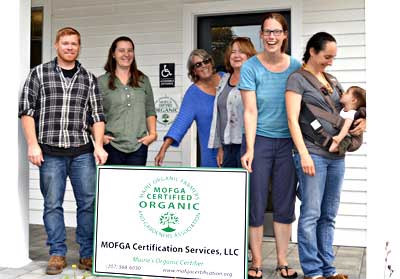 |
| A sampling of the staff of MOFGA Certification Services LLC: Left to right – Chris Grigsby, Katy Green, Laurah Brown, Grace Keown, Jacomijn Schravesande-Gardei, Katie Webb (with daughter Edith). |
By Chris Grigsby, MOFGA Certification Services LLC Director
As MOFGA moves toward its 50th birthday, the world of organic agriculture differs vastly from that world in 1971, when MOFGA was formed. In many ways the terms “success” and “achievement” describe where we have come in that time. More and more we see informed shoppers, eaters and local and regional food systems expanding with an eye toward organic and sustainable growing practices. Farmers’ markets are everywhere, selling diverse items; major grocery chains fill their aisles with organic offerings; and federal programs continue to offer support for these initiatives. Yet like many good things forced to play in the capitalist economic model, some of the original intent of a national organic standards system is eroding. While many continue to foster the ideals borne of MOFGA’s beginnings, new systems, technology and “maximizing shareholder profits” elicit increased attention and pushback from others.
The “MOFGA-certified organic” label, administered by MOFGA Certification Services (MCS) LLC, is accredited by the USDA to certify to the USDA National Organic Program (NOP) standards and the Organic Foods Production Act (OFPA). One would think that this accreditation means that all USDA-accredited certifiers make determinations and certification decisions in the same way; but the rules are not that clear and were made to be flexible as the landscape shifts and expands. Without hard and fast rules, certifiers are left to work together as a community in hopes of finding commonality. When we ask the NOP about certain scenarios and production systems that have no precedent, we often hear, “Check with other certifiers” or “The rule says this …” The authors and rule makers understood that continuous improvements and changes are necessary to adjust to a growing sector. They created mechanisms to scrutinize existing rules and to make new ones. As the organic sector has grown to meet demand, so too have allowances for certain types of production. Instead of a system-wide rulemaking approach, certification agencies have made determinations that have changed the course of the entire industry. In many cases, USDA is the entity left to sort out these interpretations and differences among certifiers. And in many cases, it is done playing catch up, as the rulemaking process is a beast that operates at a snail’s pace compared to industry.
While many of the original architects of the organic standards are dismayed at how this happened, and more importantly what to do about it, I often wonder how we can effect the change we want to see as organic grows. MOFGA does not certify hydroponic or CAFOs (concentrated animal feeding operations) based on our interpretation of the standards, yet other certifiers do.
These scenarios often leave me thinking, “What does MOFGA-certified organic really stand for?” More importantly, how do we message the MOFGA-certified difference? Here are some attributes that resonate with me:
MOFGA certified organic stands for
- Maine and the values within it
- the collective community that built the organic movement
- future generations that will continue the movement
- good, wholesome and nutritious food
- concern for the environment
- healthy living
- an ideal
What does MOFGA-certified organic mean to you? Fill in the blank – and help us continue to grow in these values. Support MOFGA-certified producers whenever possible, share their stories, advocate at all levels – and above all, eat the amazing food … one fork, spoon or cupful at a time!
